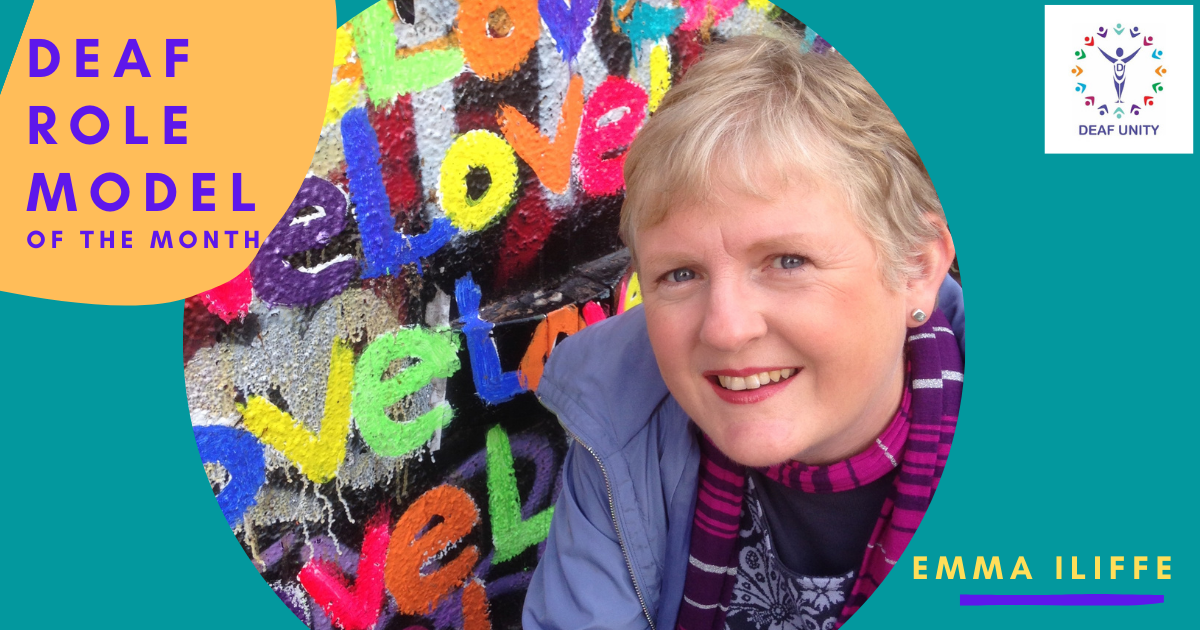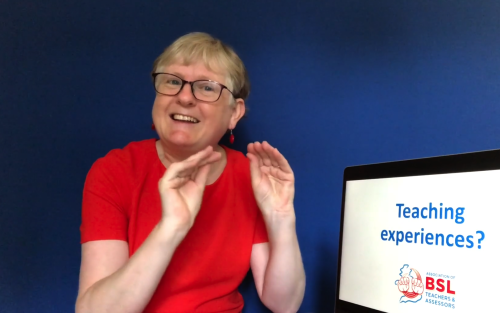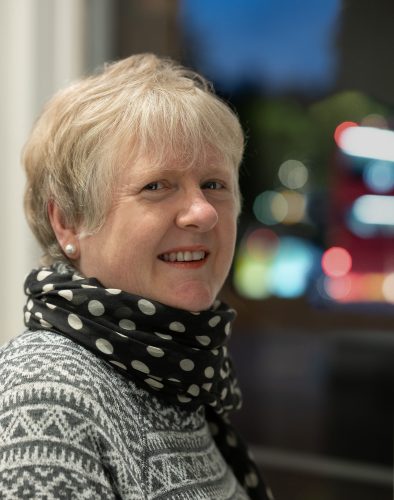
Each month we invite an inspirational or outstanding deaf role model to share their story. From what they’ve learnt, to what they wish they’d have known and their best deaf tips.
Our role model this month is a well-known face within the word of sign language teaching and learning: Emma Iliffe. So many people have been taught by Emma, been inspired by her and have learned from working alongside her. Enjoy her story of embracing her deafness and language and raising the bar of sign language training over the last four decades! Emma is now the Chair of the Association of BSL Teachers & Assessors (ABSLTA).
1. Hi Emma! Congratulations on being a Deaf Role Model – tell us about yourself?
I was born Deaf with hearing parents. I have two sisters and one of them is Deaf like me, from Deaf genes. When I was growing up at home, we communicated using Cued Speech, home signs and writing notes to each other.
Until I was 12, I went to mainstream school without any communication support at all. It was very hard and isolating. One of my schoolteachers asked me if I had any dreams about what I wanted to be as an adult. I thought about three careers: a chef, designer or teacher.
Early in my career I was an interior designer and illustrator. For two years, I was a hospital interior designer for the NHS. I became a full-time mother with two children – I’m proud that they are bilingual using BSL and spoken English. I networked with other deaf mothers by setting up the Enfield Deaf Mothers & Toddlers Group. After starting my family, I was a BSL teacher for over 20 years. I now Chair the Association of BSL Teachers & Assessors (ABSLTA).
2. What is your deaf story?
I grew up with a Deaf sister, Olivia. We went to different hearing schools but we also had private tutorial support alongside the lessons with hearing pupils. When I was 10 my smart mother found a wonderful American teacher, who used Cued Speech and American Signed Supported English which I learnt so quickly! I wish I had her earlier.
In 1976, aged 12, I had my first experience as a boarder at the St John’s School for Deaf Children in Boston Spa, Yorkshire. It was an oral school, but the pupils often used sign language with each other when the teachers were not around. Here I met one of my first Deaf role models, Margaret Bibum, who was my Deaf teacher for a time before she moved to the USA to teach Deaf students at Gallaudet University.
St John’s also introduced me to the deaf community. When I left school, I joined several Deaf Clubs like Acton, Clapham and 66 Club in London – but I chose to attend the 66 Club regularly because of its Drama Club.
3. What was your experience of education as a deaf person?
In my early education, schools didn’t provide British Sign Language because linguists in the UK had not identified that it was a true language that could be used in educational settings before 1975. Sadly, in my time, schools did not encourage Deaf people like me, without speech, to become Deaf Teachers of Deaf children.
In my further education at Southwark College of Art & Design I was given a Communication Support Worker (CSW) and a note taker who used Signed Supported English. This fantastic support was provided by City Lit, but only once a week.
In 1986, I applied to Durham University to study BSL Teacher Training and met three Deaf lecturers, Clark Denmark, Francis Elton and Dorothy Miles who hugely inspired me. They made it clear that we BSL Teachers can teach without our voices!

4. Have you faced any obstacles or challenges from being deaf and how have you overcome these?
I know I am Deaf but I’m proud to demonstrate that I can do everything except hear! I had a Deaf sister as I grew up and she really helped to give me a strong Deaf identity. Some hearing people say that I make some mistakes with my English grammar; but I respond that hearing people make mistakes with their BSL grammar too! We have to be understanding of each other.
5. Why did you choose to specialise in the teaching of sign language?
I chose to specialise in teaching sign language because of my experiences with hearing society; so many hearing parents and teachers of the deaf couldn’t or wouldn’t sign. I strongly believe that Deaf people have the right to access Deaf Studies – including Deaf History, Deaf people, Deaf Community, BSL and BSL linguistics. It should be included in our education.
6. There has been a lot of discussion around the BSL Act – why do you believe we need this and what more can be done to make it a reality in England?
90% of deaf children come from hearing families and attend mainstream schools. We miss 75% of the information in classrooms without BSL support.
7. There has been a renewed push to have BSL taught in schools, but this has highlighted the issue of the lack of native language BSL teachers and/or the qualifications of those who teach BSL. What do you see as the issues and the possible solutions?
We need a dramatic expansion of training courses that enable deaf people to acquire teaching theory and practice. It is not enough to just be deaf and use sign language. It is important to have formal teaching skills too – to understand the linguistics, to know the different ways that students learn, to be able to plan lessons, evaluate progress and to make adaptations for people with disabilities. We need more government funding for BSL teacher training courses.
8. What is your view on the subject of sign language appropriation – hearing people signing songs or teaching: is it a language issue or a cultural issue. Or both?
It is both a language and a cultural issue. We want hearing people to be good allies of deaf people, to support us to achieve access and equality. Most hearing people are very supportive, but a smaller number take advantage of deaf people – for example using sign language primarily to advance their own cause and earn income whilst doing little or nothing to support deaf people. To give an example, a hearing man in Australia has his own TV programme and signs songs to get attention. He doesn’t feature deaf people in this programme. This is ‘cultural appropriation’ – using our sign language for personal gain only.
9. The Deaf Community often doesn’t feel included in mainstream society, but within the Community we have our own divisions – hearing levels, signing proficiency, gender, sexuality etc. Have things improved in your experience, and what more can be done to make the Community more cohesive?
I think the deaf community is better than the hearing world in that there is more cohesiveness across racial, sexual and cultural boundaries. But it is not perfect and all of us deaf people must continue to work at being inclusive of all other deaf people – for example, not just those with privileged access to opportunities denied to other deaf people.

10. Who inspires you and why?
My chosen deaf role model is a deaf woman, Margaret Bibum, who was my teacher at St John’s. She was the first deaf person I ever met who was a deaf teacher too. She inspired me to believe that deaf people can do anything except hear perfectly. She had previously been a pupil at the school, alongside her childhood friend, Aloysius, who came from Cameroon, Africa. When they grew up, they got married, and eventually both went to Cameroon to set up the country’s first deaf school.
11. What ways do you think hearing people can be allies to the deaf community? Any DOs and DON’Ts?
Be our friends and supporters, but don’t take over
12. 3 top tips for deaf people?
1. Set yourself goals in life – if we have no goals we can’t learn and improve
2. Commit to lifelong learning – it doesn’t matter what age we are, we can always learn new things – about language, technology, legal rights, etc.
3. Work hard – it’s not enough just to be deaf and expect to be given things, we have to work hard too.
To read more inspirational role model interviews, take a look here.
Looking for more support? We’ve made it our mission to improve the lives of deaf people everywhere. Check out Deaf Unity’s projects to find out what we can do for you. If you’d like to get in touch, contact us here.


This is a wonderful story. I am proud to have Emma Iliffe not only as a colleague within ABSLTA but as a friend too.
Lovely hearing your comment. It is important to support each other like you x
Hearing families of deaf children need to hear Deaf people’s views and experiences like this. They don’t all have the opportunity to do this first-hand and there are wonderful achievements out there that will help them guide their children’s future. Emma’s uplifting story gives great depth of insight to help them to understand and inspire them too, thank you.